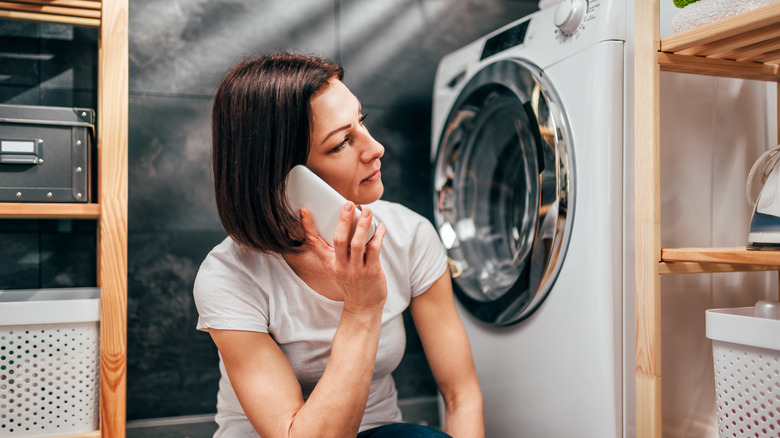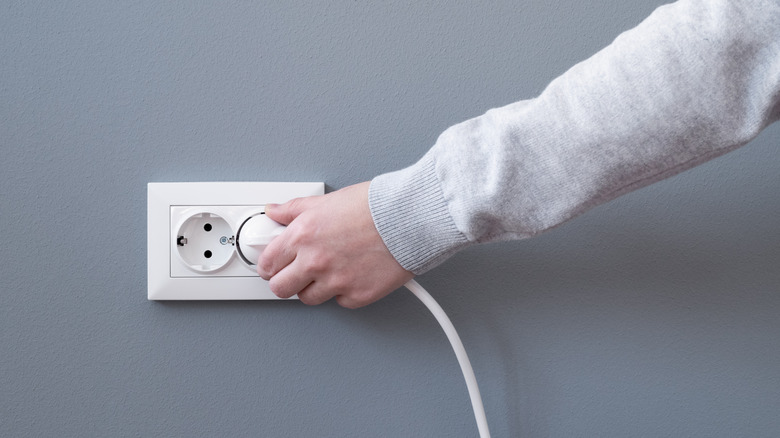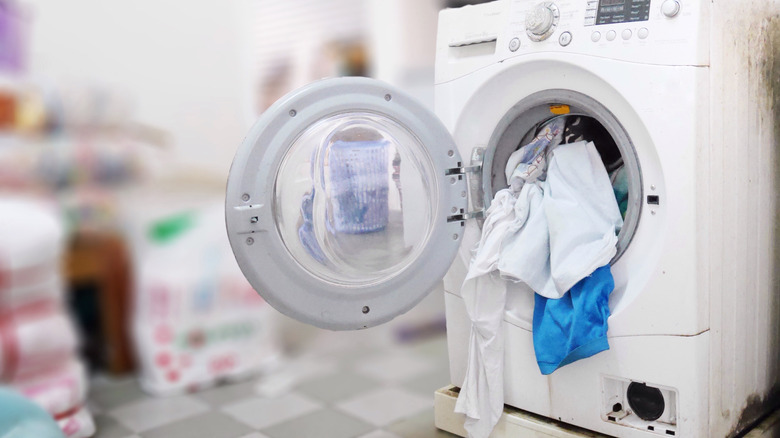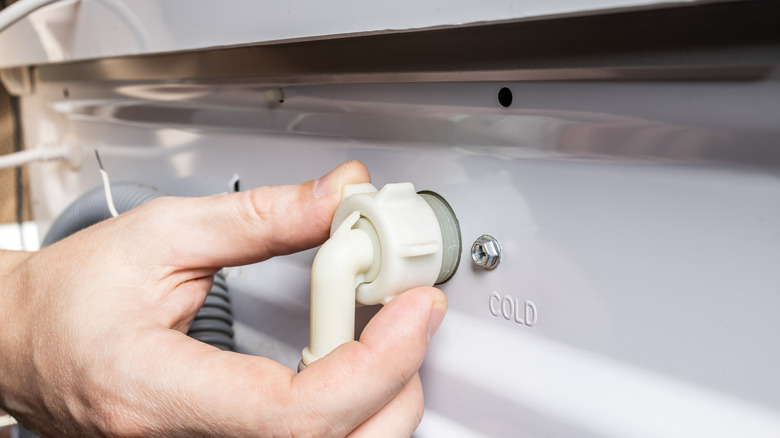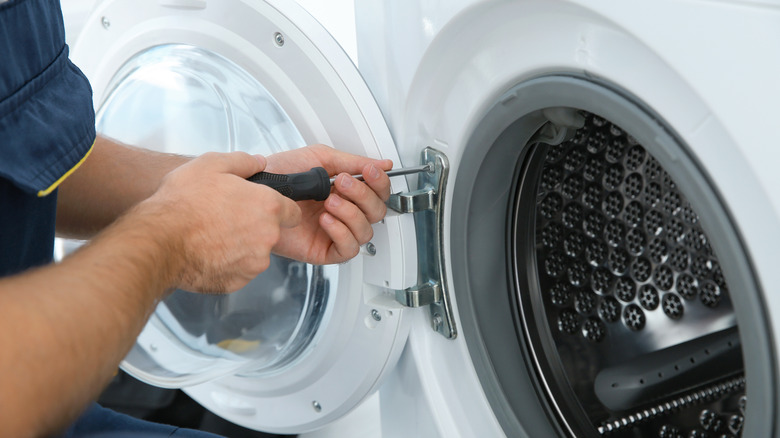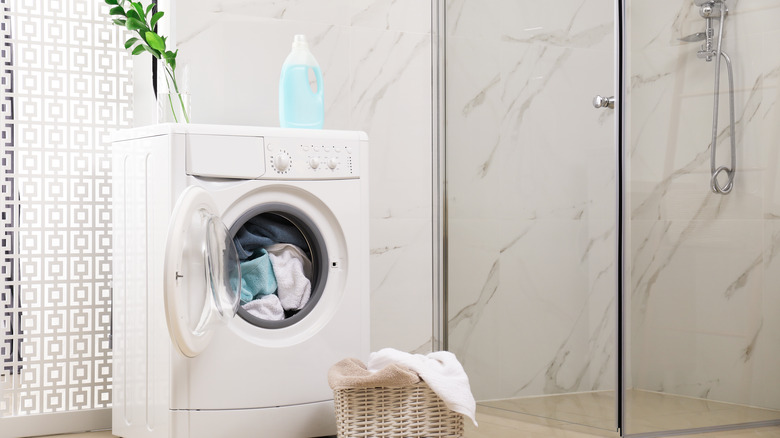Common Reasons Your Washing Machine Isn't Working
Your washing machine is likely to be one of the most used appliances in your home. Whether you live alone or in a big household, the dirty clothes bin can pile high if you find yourself in the nightmare scenario of having a broken machine with no idea how to fix it. When you rely on an appliance to get through day-to-day life, it can bring plans to a standstill when it no longer works. However, calling out a repair person for every bang, leak, and blunder can be expensive and feel excessive.
Which explains that blockages and power cuts are easy to resolve, but some issues require the help of a professional. Additionally, Mix Repairs writes that there can be a multitude of really common reasons why your washing machine may not start or may stop mid-cycle. If you're going to investigate yourself, then they explain that you should ensure that all the power to the machine and the surrounding appliances are switched off while doing so.
Home Tips explains that in just one wash, washing machines go through a cycle of being filled, washing, draining, and spinning. This seems basic, but over time it can cause a lot of wear and tear. So, if you're worried that your washing machine isn't functional and you're not sure whether it needs professional attention, here are some of the most common reasons your washing machine isn't working.
Check your washing machine's power plug
Checking that your washing machine is plugged in may sound a little bit basic, but Dan-Marc Appliance outlines that the most common reason why your washing machine isn't working is that it doesn't have power. Most power plugs for washing machines are situated behind the machine and it isn't uncommon that, as the machine rocks or vibrates during a wash, the power plug may be pulled out of the wall.
Think Tank Home writes that you should also verify that your machine is getting the power that it needs. You can check the outlet voltage with a multimeter check. If your machine isn't getting adequate power, then it'll likely trip a switch on your electricity panel; all you'll need to do is flip it back. If it's a recurring problem then you should consider speaking to an electrician.
Getting a professional out to access a tripped switch or plug that has fallen out of the wall could be embarrassing. However, if you're going to check these problems out for yourself, make sure that you take the necessary precautions and be wary of the power sources of your washing machine.
The washing machine is overloaded
When you're in a rush or the weather is particularly nice, it can be really tempting to fill your washing machine with as many items as possible so you can hang them up to dry quicker. However, Which explains that overloading your washing machine doesn't just mean that your clothes and sheets aren't washed as effectively — it could also cause some damage.
Repair Aid outlines that one of the most common issues with washing machines is when they don't spin properly. Filing the drum to the brim with garments can mean that they have no room to move, and therefore the spin function won't work. At best this can leave your clothes still a little bit dirty, and at worst your clothes will come out of the machine soaking wet. If you find that your washing machine won't start with your current load, try readjusting it. If it continues then lessen the load.
Your washing machine's drainage pump is blocked
If you've checked the power and cut down on how much you're putting in the washing machine and it still isn't working, then there may be an issue with the machine itself. If you're not familiar with the mechanics of washing machines then this can ring alarm bells. However, Home Tips explains that one of the most common and easily resolved issues with washing machines is when the drainage pump gets blocked. If this is the case you may notice that your wash stops mid-cycle, dirty water rises up in the drum, and the door won't open. This means that your clothes or sheets are left in the machine in dirty water, and this can be far from ideal.
Think Tank Home writes that all sorts of objects can lead to your drain pump getting blocked. It may be something as small as a sports sock, hair tie, coin, and if you have long hair it may build up in your machine over time. In order to inspect your drain pump and check for blockages, you'll need to drain the machine and then disconnect and look inside the hoses. You also may need to take the pump off in order to inspect it up close.
Your washing machine's timer is broken
Different washing machines have different wash options and spin cycle times; there's no one-size-fits-all when it comes to taking care of your clothes. And Mix Repairs writes that if your washer doesn't start, stops halfway through a cycle, or doesn't stop at all then the timer on your machine may be faulty. If the timer is broken you may also struggle to open the door to your machine as they're are designed to unlock the door at the end of the designated wash time.
If your washing machine is failing to fill with water at all and the spin cycle doesn't begin, then it could be another indicator that you've got an issue with the timer, Home Tips explains. As this is an issue to do with the mechanics of your washing machine, it's best that you reach out to a professional who should be able to locate the problem and advice you on your best next step.
Your washing machine's lid switch is broken
Another incredibly common issue that may lead to your washing machine coming to a standstill is if your lid switch is broken or partially faulty. Home Tips explains that the lid switch on your machine is either found on the top or front of it (by the lid as the name would suggest) under the lid.
If the lid switch or the tab on the lid is broken then it's very likely that your machine will stop during cycles or won't work at all. Think Tank Home explains that most modern washing machines are designed to stop if the lid is open or not secured properly. This is a function that you're thankful for 99% of the time. However, if it becomes faulty or breaks then it may mean that your washing machine won't start at all.
Before you call out a mechanic, ensure that the door on your washing machine is closed properly. If it continues to stop during spins or does not start at all then it may indicate that the lid switch isn't working.
